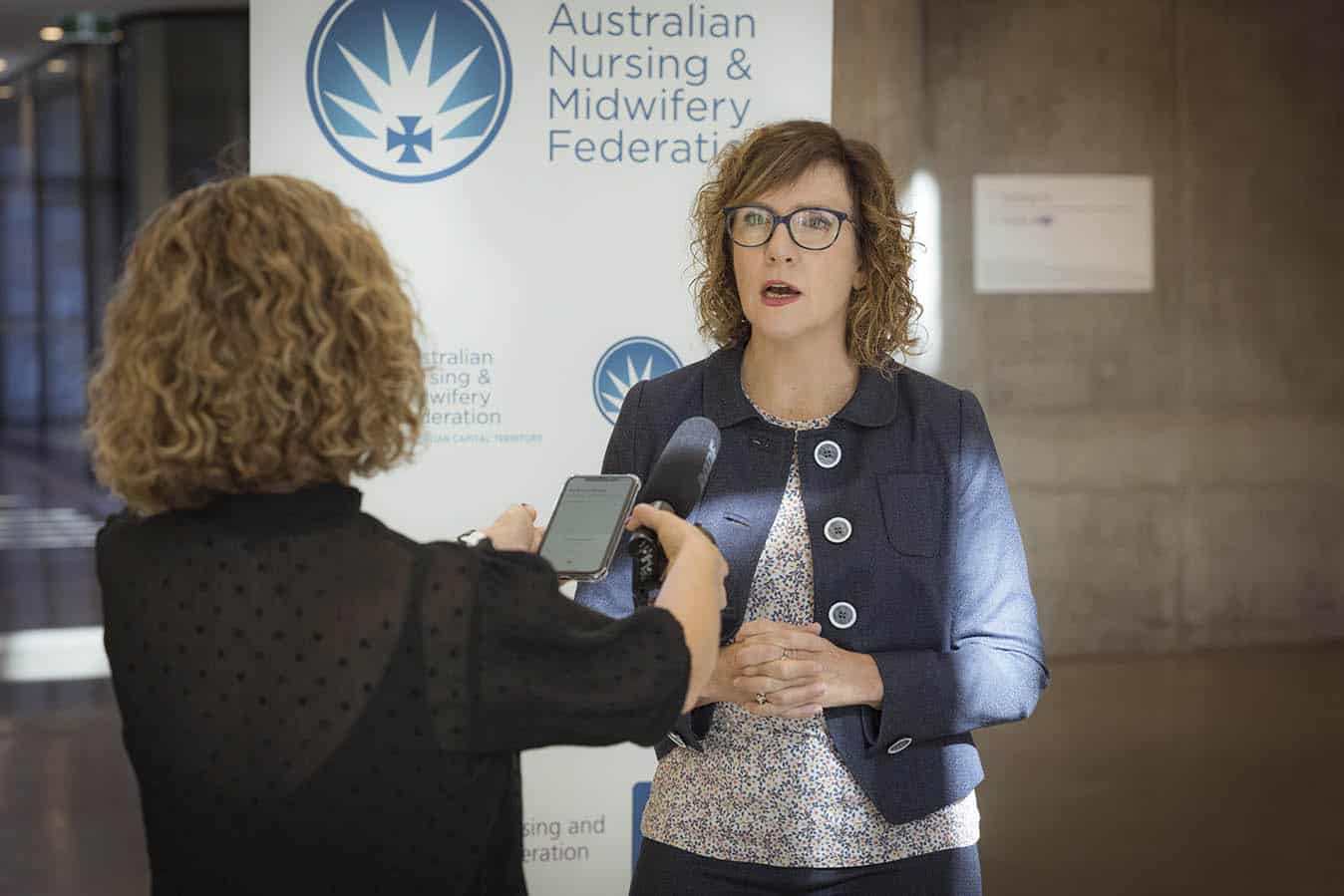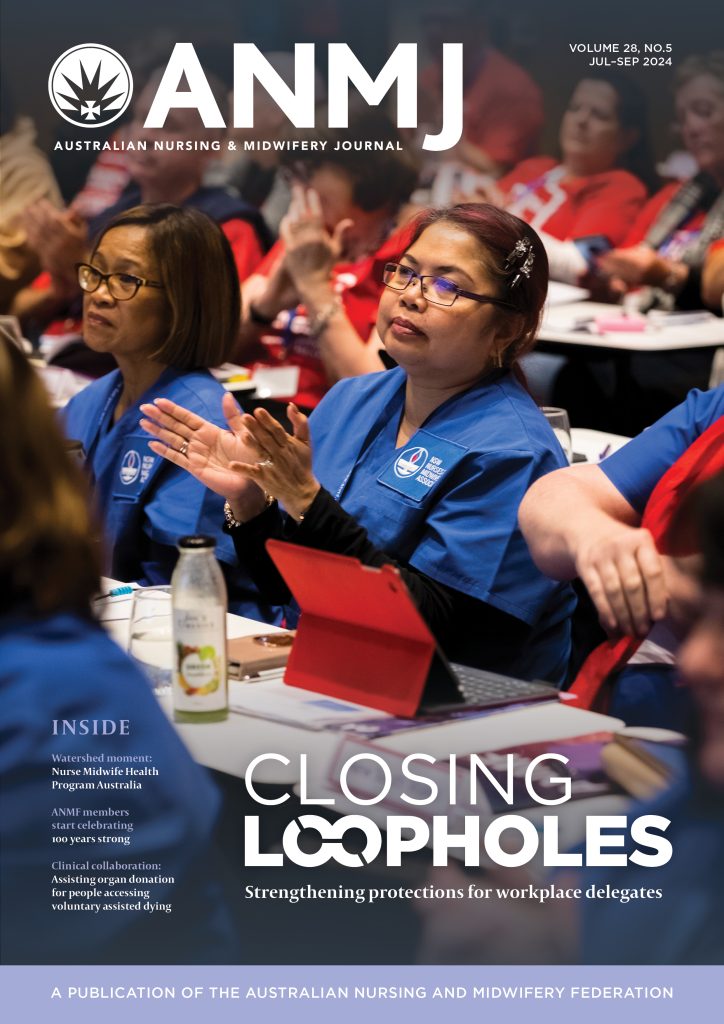The Federal Budget handed down last night provides a pathway for nurses and midwives to deliver better healthcare across communities, according to the Australian Nursing and Midwifery Federation (ANMF).
The ANMF has welcomed the Albanese Government’s review of the scope of practice of healthcare professionals, including nurses and midwives, along with other key investments as part of a $6.1 billion dollar funding package to strengthen Medicare and revamp primary healthcare. This includes bigger incentives to bulk bill, cheaper medicines, increased access and more affordable care.
The 2023–24 Budget provides $101.0 billion in health and $36.0 billion in aged care. Priority investments are: to build a stronger Medicare, health prevention and protection, tackling smoking and vaping, mental health and suicide prevention, and First Nations health.

Changes announced in the Budget will enable nurse practitioners (NPs) and participating midwives to prescribe PBS medicines and provide services under Medicare without the need for a legislated collaborative arrangement and will increase MBS rebates for standard NP attendance items. MyMedicare will be extended to NPs and other primary care providers.
ANMF Federal Secretary Annie Butler said the removal of collaborative arrangements with doctors for NPs and eligible midwives along with the 30% increase in Medicare rebates would enable timelier, accessible care for communities.
“The ANMF and our members believe this is a positive, first-step in putting nurses and midwives at the centre of genuine Medicare reforms and playing a key role in multi-disciplinary models of care across the community,” Ms Butler said.
“Under existing workplace arrangements, nurses and midwives are under-utilised, so these initiatives will start to recognise their true worth and how crucial they are in improving access to quality care for people when and where they need it, particularly in rural and regional areas, where crippling workforce shortages are continuing to impact healthcare.”
Ms Butler said $445 million for the Workforce Incentive Payment (WIP) would encourage eligible general practices to employ more nurses, NPs and midwives. She called on the government to continue to develop funding models, which genuinely incentivise multi-disciplinary models of care, where a consumer can choose their lead clinician, to improve chronic disease management and, critically, reduce pressure on EDs and hospitals.
The Budget reinforced the government’s commitment to aged care with an overall spend in aged care of $36 billion in 2023-24.
The ANMF welcomed $11.3 billion to fund the long-awaited 15% pay rise for the underpaid aged care workforce, but re-emphasised the need for the government to enforce tight-rules on providers’ use of the money.
“We applaud the government’s genuine commitment to improving care for older Australians and valuing those caring for them, but we emphasise, once again, the critical need for the government to formulate mechanisms which ensure accountability and transparency around these taxpayer funds to guarantee that all funding intended for wage increases is used solely for its intended purpose, that is, for the pay packets of all aged care workers.
We will continue to work constructively with the Government to ensure this happens,” Ms Butler added.
2023-2024 total new investments $27.9 billion:
- $6.1 billion Strengthening Medicare
- $818.5 million First Nations health
- $1.1 billion Health prevention and protection
- $737 million Smoking and vaping cessation
- $586.9 million Mental health
- $11.3 billion for aged care workforce pay rise
Key wins
- Medicare patient rebates for care provided by nurse practitioners will be increased by 30%.
- Nurse practitioners and participating midwives to prescribe PBS medicines and provide services under Medicare without the need for a legislated collaborative arrangement and will increase MBS rebates for standard nurse practitioner attendance items ($46.8m).
- $4.2 million for additional 6,000 practice nursing placements.
- $50.2 million for 1,850 post graduate scholarships to train more nurse practitioners and endorsed midwives.
- $1 million to attract 500 previously enrolled and registered nurses to return to the workforce.
- Tripling of the bulk-billing incentive payments for concession card holders, pensioners and people under 16. Incentives to cover face-to-face and telehealth GP consultations (3.5 billion).
- There will be a new Medicare rebate for consultations of 60 minutes or longer to benefit people with chronic conditions and complex needs ($98.2m).
- PHNs will be funded to commission multidisciplinary care from allied health, nurses and midwives ($79.4m) to support smaller or solo primary care practices, for management of chronic conditions.
- Workforce incentives for primary care practices to employ various health professionals, to provide team-based primary care ($445.1m).
- $818.5 million for First Nations health
- Cost of living relief package, including increased access to the single parenting payment for children up to 14.
- Additional $2.2 billion for new and amended PBS listings and $259.5 million for other critical health infrastructure.
- More than 300 common medicines will be cheaper for 6 million Australians who will be able to buy 2 months’ worth of medicine with a single prescription (saving up to $180 per year for each eligible medicine).
- $951.2 million digital health package including to upgrade and modernise My Health Record.
- $586.9 million to expand mental health and suicide prevention supports.
- $40.6 million to support equity in the healthcare system and improve the health of Australian women and girls.
Aged care
- $11.3 billion to fund the Fair Work Commission’s interim decision for a record 15% pay increase for over 250,000 aged care workers.
- $59.5 million to progress the National Worker Registration Scheme.
- $72.3 million for a new regulatory framework in how providers are regulated.
- New Aged Care Taskforce to review aged care funding arrangements.
- Extension of the Disability Support for Older Australians program.
- $77.3 million for the National Aboriginal and Torres Strait Islander Flexible Aged Care Program to ensure First Nations elders access culturally safe care.
- Appointment of an Interim First Nations Aged Care Commissioner.









